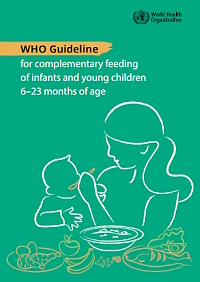WHO Guideline for Complementary Feeding of Infants and Young Children 6-23 Months of Age
Complementary feeding, defined as the process of providing foods in addition to milk when breast milk or milk formula alone are no longer adequate to meet nutritional requirements, generally starts at age 6 months and continues until 23 months of age. This is a developmental period when it is critical for children to learn to accept healthy foods and beverages and establish long-term dietary patterns. It also coincides with the peak period for risk of growth faltering and nutrient deficiencies.This guideline provides global, normative evidence-based recommendations on complementary feeding of infants and young children 6–23 months of age living in low, middle- and high-income countries. It considers the needs of both breastfed and non-breastfed children. The guideline supersedes the earlier Guiding Principles for Complementary Feeding of the Breastfed Child and Guiding principles for feeding non-breastfed children 6-24 months of age.
Responsive feeding is one of the 7 categories of recommendations.
Related links:
• Feed to fail: the crisis of children's diets in the early years
• Indicators for assessing infant and young child feeding practices
• Nuruturing children through responsive feeding
Organization: World Health Organization
Year: 2023
Language: English
Web link: https://www.who.int/publications/i/item/9789240081864





